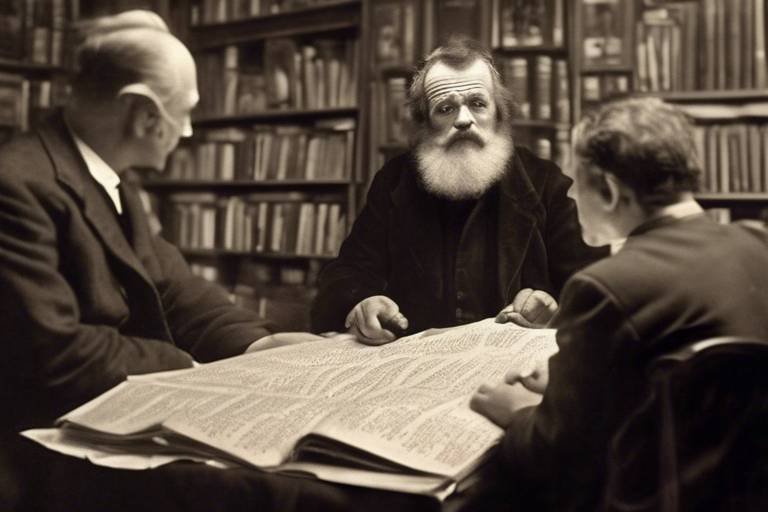Advancing the Philosophy of Existentialism
Existentialism, a philosophical movement that has captivated thinkers and laypeople alike, invites us to ponder the very essence of our existence. It dives deep into the complexities of human life, encouraging us to confront our own freedom, choices, and responsibilities. This article explores the evolution of existentialist thought, its key figures, and contemporary applications, aiming to deepen understanding of its principles and relevance in modern society. Have you ever found yourself questioning your purpose or the meaning behind your actions? If so, you're not alone. Existentialism resonates with many who grapple with these profound queries.
At its core, existentialism challenges us to embrace the uncertainty of life. It posits that we are not merely products of our environment or predetermined destinies; instead, we are the architects of our own lives. This philosophy encourages individuals to navigate through the chaos, ultimately crafting their own meanings and values. Imagine standing at a crossroad, where every path represents a different choice. Each decision shapes who you become, and existentialism urges you to take ownership of that journey. It's empowering, isn't it?
Throughout history, existentialism has evolved, influenced by various philosophical movements and thinkers. From the early ideas of Søren Kierkegaard, who emphasized individual experience and subjective truth, to the more modern interpretations by Jean-Paul Sartre and Simone de Beauvoir, the philosophy has continually adapted to address the nuanced realities of human existence. In this article, we'll delve into the foundational ideas that shaped existentialist thought and the profound impact these ideas have on contemporary life.
As we explore existentialism further, we will uncover its relevance in today's world. In an era marked by rapid change and uncertainty, the principles of existentialism provide a framework for understanding our place within society. It encourages us to confront our fears, embrace our freedom, and recognize the weight of our choices. Whether you're navigating personal relationships, career decisions, or societal expectations, the insights from existentialist thinkers can illuminate your path.
In the sections that follow, we will examine the key figures in existentialism, their contributions, and the lasting impact of their ideas. We will also explore how existentialism finds expression in literature, offering a deeper understanding of its themes such as absurdity, alienation, and the relentless search for meaning. So, buckle up as we embark on this intellectual journey through the fascinating world of existentialism!
- What is existentialism? - Existentialism is a philosophical movement that emphasizes individual freedom, choice, and the inherent meaninglessness of life, urging individuals to create their own meaning.
- Who are the key figures in existentialism? - Prominent figures include Jean-Paul Sartre, Simone de Beauvoir, and Søren Kierkegaard, each contributing unique perspectives to the philosophy.
- How does existentialism relate to literature? - Existential themes are prevalent in literature, with authors like Albert Camus and Franz Kafka exploring concepts such as absurdity and alienation.
- Why is existentialism relevant today? - In a rapidly changing world, existentialism encourages individuals to confront their choices and responsibilities, providing insight into personal and societal challenges.

The Origins of Existentialism
Existentialism, a philosophical movement that emphasizes individual existence, freedom, and choice, has its roots deeply embedded in the rich soil of earlier philosophical traditions. To truly understand this compelling school of thought, we must journey back in time and examine the various intellectual currents that paved the way for its emergence. The seeds of existentialism can be traced to the works of thinkers such as Søren Kierkegaard and Friedrich Nietzsche, who, although not existentialists in the strictest sense, laid the groundwork for many existentialist ideas.
Kierkegaard, often heralded as the "father of existentialism," introduced concepts of individuality and the importance of personal choice. He posited that existence precedes essence, meaning that individuals are not defined by predetermined roles or societal expectations, but rather through their choices and actions. His exploration of the "leap of faith" captures the essence of existentialist thought, urging individuals to embrace uncertainty and make authentic choices, despite the anxiety that may accompany them.
On the other hand, Nietzsche's proclamation that "God is dead" represents a pivotal moment in philosophical thought. This statement was not merely a declaration of atheism but a profound commentary on the loss of objective meaning in life. Nietzsche's ideas about the "Übermensch" or "Overman" challenge individuals to create their own values and meanings in a world that offers none. This radical freedom, however, comes with the burden of responsibility, a theme that resonates deeply within existentialism.
In addition to Kierkegaard and Nietzsche, the influence of phenomenology and existential psychology cannot be understated. The works of Edmund Husserl and Martin Heidegger introduced new ways of thinking about consciousness and existence, emphasizing the subjective experience of being. Heidegger’s exploration of "Being" and the concept of "thrownness" provided existentialists with a framework to discuss the inherent anxiety of existence, further enriching the philosophical landscape.
As existentialism began to take shape in the 20th century, it became intertwined with the social and political upheavals of the time. The aftermath of World War II, marked by disillusionment and a quest for meaning, propelled existentialist thought into the limelight. It resonated with individuals grappling with the absurdity of existence and the search for authenticity in a world rife with conflict and chaos.
In summary, the origins of existentialism are a tapestry woven from various philosophical threads. From Kierkegaard’s emphasis on personal choice to Nietzsche’s challenge to create meaning, these early thinkers set the stage for a movement that would profoundly impact literature, psychology, and contemporary thought. Understanding these origins not only deepens our appreciation for existentialism but also invites us to reflect on our own existence and the choices that define us.
- What is existentialism? Existentialism is a philosophical movement that explores individual existence, freedom, and the search for meaning in a seemingly indifferent universe.
- Who are the key figures in existentialism? Prominent figures include Søren Kierkegaard, Friedrich Nietzsche, Jean-Paul Sartre, and Simone de Beauvoir.
- How did existentialism influence modern thought? Existentialism has shaped various fields, including literature, psychology, and ethics, encouraging individuals to confront their existence and make authentic choices.

Key Figures in Existentialism
Existentialism is a rich and complex philosophy that has been shaped by numerous thinkers over the years. Among these, a few stand out for their profound contributions and unique perspectives. Understanding these key figures is essential for grasping the essence of existentialist thought. The most notable philosophers include Jean-Paul Sartre, Simone de Beauvoir, and Søren Kierkegaard. Each of them brought their own experiences and insights, creating a tapestry of ideas that continues to influence contemporary philosophy and culture.
Jean-Paul Sartre is often regarded as the face of existentialism. His works, such as Being and Nothingness, delve deep into the concepts of freedom, choice, and the weight of responsibility. Sartre famously declared, "Existence precedes essence," suggesting that individuals are not born with a predetermined purpose; instead, they must forge their own path. This radical belief in freedom is both liberating and daunting, as it places the onus of meaning squarely on the individual.
On the other hand, Simone de Beauvoir expanded existentialism to include feminist perspectives, emphasizing the importance of women's freedom and identity. In her groundbreaking work, The Second Sex, she explored how societal constructs limit women's potential and how they can transcend these limitations through existentialist principles. De Beauvoir argued that one cannot be free without recognizing the freedom of others, highlighting the interconnectedness of existence.
Søren Kierkegaard, often considered a precursor to existentialism, laid the groundwork for later existentialist thought. His exploration of individual existence, anxiety, and faith set the stage for subsequent thinkers. Kierkegaard's idea of the "leap of faith" illustrates the necessity of personal choice in the face of uncertainty, emphasizing that true understanding comes from within rather than from external doctrines.
To better understand these figures and their contributions, let's take a look at a brief comparison:
| Philosopher | Key Contributions | Notable Works |
|---|---|---|
| Jean-Paul Sartre | Freedom, Responsibility, Bad Faith | Being and Nothingness, No Exit |
| Simone de Beauvoir | Feminist Existentialism, Identity | The Second Sex, The Ethics of Ambiguity |
| Søren Kierkegaard | Individual Existence, Faith | Fear and Trembling, Either/Or |
These philosophers not only shaped the foundations of existentialism but also influenced various fields, including literature, psychology, and political theory. Their ideas challenge us to confront our own existence and consider the implications of our choices. Existentialism invites us to ask ourselves: What does it mean to be free? How do our choices define us? In a world that often feels chaotic and absurd, these questions resonate deeply, encouraging us to explore the very essence of our being.
- What is existentialism? Existentialism is a philosophical movement that focuses on individual existence, freedom, and choice, emphasizing the importance of personal experience in creating meaning.
- Who are the main philosophers associated with existentialism? The main figures include Jean-Paul Sartre, Simone de Beauvoir, and Søren Kierkegaard, each contributing unique perspectives to the philosophy.
- How does existentialism relate to literature? Existentialist themes are prevalent in literature, exploring concepts like absurdity, alienation, and the quest for meaning, as seen in the works of authors like Albert Camus and Franz Kafka.

Jean-Paul Sartre's Contributions
Jean-Paul Sartre, a towering figure in the realm of existentialism, significantly reshaped our understanding of freedom and responsibility. His work not only challenged traditional philosophical paradigms but also offered a radical rethinking of what it means to be human. Sartre famously declared that “existence precedes essence,” suggesting that individuals are not born with a predetermined purpose but rather create their own essence through choices and actions. This idea is revolutionary because it places the burden of meaning squarely on our shoulders. We are not just passive recipients of life’s narrative; we are the authors of our own stories.
At the heart of Sartre's philosophy lies the concept of radical freedom. He posited that humans are condemned to be free, meaning that every choice we make is a reflection of our freedom—and with that freedom comes an immense weight of responsibility. Imagine standing at a crossroads with countless paths ahead; the freedom to choose can be exhilarating, yet terrifying. This notion can lead to existential angst, a feeling of dread that arises when we realize the implications of our choices. Sartre's exploration of this idea encourages us to confront our decisions head-on, rather than retreating into the comfort of conformity.
Another crucial aspect of Sartre's thought is the notion of bad faith. This term refers to the self-deception that individuals engage in to escape the anxiety that accompanies true freedom. It’s akin to putting on blinders; we convince ourselves that we have no choice to avoid the discomfort of making decisions. Sartre illustrated this concept through various examples, such as a waiter who overly identifies with his role, acting as if he is nothing more than a mere function of his job. This serves as a reminder that while we may try to evade our freedom, we cannot escape the inherent responsibility that accompanies it. In everyday life, the struggle against bad faith is a constant battle, urging us to acknowledge our freedom and the choices we make.
Moreover, Sartre's contributions extend beyond philosophy into the realms of literature and political activism. His novels, plays, and essays not only embody existentialist principles but also reflect the complexities of human relationships and societal structures. Works like Nausea and No Exit delve into themes of alienation and the search for meaning, illustrating how existentialist ideas permeate everyday life. Sartre's activism, particularly his involvement in political issues, showcased his belief that philosophy should not remain confined to academic circles but should actively engage with the world. He believed that philosophy should inspire action and provoke thought, pushing individuals to confront their reality and the systems that govern it.
In summary, Sartre's contributions to existentialism are profound and multifaceted. He not only challenged us to embrace our freedom and the responsibilities that come with it but also provided a framework for understanding the human condition in a world that often feels absurd. By emphasizing the importance of choice and the dangers of bad faith, Sartre invites us to live authentically, crafting our own identities in an ever-changing world. His legacy continues to resonate, reminding us that our lives are ours to shape, and the choices we make define who we are.
- What is existentialism? Existentialism is a philosophical movement that emphasizes individual freedom, choice, and the search for meaning in a seemingly indifferent universe.
- Who was Jean-Paul Sartre? Jean-Paul Sartre was a French philosopher, playwright, and novelist, known for his contributions to existentialist thought and his exploration of freedom and responsibility.
- What does "existence precedes essence" mean? This phrase means that individuals are not born with a predetermined purpose; instead, they create their own essence through their actions and choices.
- What is bad faith? Bad faith is a concept introduced by Sartre that refers to self-deception, where individuals deny their freedom and responsibility to escape the anxiety of making choices.

bad faith,
This article explores the evolution of existentialist thought, its key figures, and contemporary applications, aiming to deepen understanding of its principles and relevance in modern society.
Examining the historical roots of existentialism, this section delves into the philosophical movements that influenced its emergence, highlighting key thinkers and their contributions to the foundational ideas of existentialist thought.
This segment focuses on the prominent philosophers who shaped existentialism, including Jean-Paul Sartre, Simone de Beauvoir, and Søren Kierkegaard, discussing their unique perspectives and lasting impact on the philosophy.
An analysis of Sartre's existentialist ideas, particularly his concepts of freedom, responsibility, and the notion of bad faith, illustrating how his work challenged traditional philosophical views.
Exploring Sartre's belief in radical freedom, this section discusses the implications of choice and the burden of responsibility that comes with it, emphasizing its significance in existentialist thought.
Bad faith is a fascinating yet troubling concept introduced by Jean-Paul Sartre. It refers to the act of self-deception, where individuals deny their own freedom and responsibility by convincing themselves that they are bound by external circumstances. Imagine standing at a crossroad, knowing you have the power to choose your path, yet choosing to remain paralyzed by fear or societal expectations. This is the essence of bad faith—an escape from the anxiety that comes with true freedom. Sartre argues that in our daily lives, we often engage in bad faith to avoid facing the uncomfortable truth of our choices. We might say, "I had no choice," when, in reality, we did. This denial can take various forms:
- Rationalization: Justifying our actions by blaming external factors.
- Conformity: Following societal norms without questioning our desires.
- Victimhood: Embracing a victim mentality to evade responsibility.
By recognizing these patterns, we can begin to confront our own bad faith. Sartre believed that acknowledging our freedom is essential for authentic living. When we accept that we are the architects of our lives, we can embrace the weight of our choices and the freedom that comes with them. This realization can be both liberating and daunting, as it challenges us to take ownership of our existence. In a world that often pushes us towards conformity, the struggle against bad faith becomes a personal revolution.
Investigating de Beauvoir's contributions to existentialism, this part emphasizes her integration of feminist theory, particularly her exploration of women's freedom and identity within an existential framework.
This section examines how existentialist themes manifest in literature, showcasing works by authors such as Franz Kafka and Albert Camus, and their exploration of absurdity, alienation, and the search for meaning.
Analyzing Albert Camus' concept of the absurd, this subsection discusses how it reflects the human condition and the struggle to find meaning in an indifferent universe.
This part highlights Franz Kafka's exploration of existential dilemmas, focusing on themes of alienation and existential angst as depicted in his iconic works.
- What is existentialism? Existentialism is a philosophical movement that emphasizes individual freedom, choice, and the search for meaning in an often indifferent universe.
- Who are the key figures in existentialism? Prominent figures include Jean-Paul Sartre, Simone de Beauvoir, and Søren Kierkegaard, each contributing unique perspectives to the philosophy.
- What does bad faith mean? Bad faith refers to the self-deception individuals engage in to avoid confronting their freedom and responsibility, often leading to a denial of true choice.
- How does existentialism relate to literature? Existentialist themes such as absurdity, alienation, and the quest for meaning are prevalent in the works of authors like Albert Camus and Franz Kafka.

illustrating how his work challenged traditional philosophical views.
This article explores the evolution of existentialist thought, its key figures, and contemporary applications, aiming to deepen understanding of its principles and relevance in modern society.
Examining the historical roots of existentialism, this section delves into the philosophical movements that influenced its emergence, highlighting key thinkers and their contributions to the foundational ideas of existentialist thought.
This segment focuses on the prominent philosophers who shaped existentialism, including Jean-Paul Sartre, Simone de Beauvoir, and Søren Kierkegaard, discussing their unique perspectives and lasting impact on the philosophy.
Jean-Paul Sartre's existentialist ideas were nothing short of revolutionary, illustrating how his work challenged traditional philosophical views. Before Sartre, philosophy often leaned towards determinism, suggesting that human behavior was largely dictated by external forces or innate qualities. Sartre flipped this notion on its head with his assertion that we are fundamentally free beings, responsible for our choices and the meaning we create in our lives. He argued that existence precedes essence, meaning that individuals first exist and then define themselves through their actions. This radical idea challenged the long-held belief that our essence or purpose is predetermined by nature or God.
Sartre's emphasis on freedom and responsibility brought a fresh perspective to philosophical discourse. He argued that with freedom comes the weight of responsibility, as individuals must confront the consequences of their choices. This idea is encapsulated in his famous phrase, "Man is condemned to be free," which suggests that our freedom is both a gift and a burden. By rejecting the idea of a predetermined path, Sartre positioned individuals as the architects of their own destinies, a stark contrast to traditional views that often placed humans within a broader cosmic plan.
Exploring Sartre's belief in radical freedom, this section discusses the implications of choice and the burden of responsibility that comes with it, emphasizing its significance in existentialist thought. Sartre believed that we are always at a crossroads, faced with choices that define who we are. This notion of choice is liberating yet daunting, as it forces individuals to confront the reality that they cannot escape their freedom. Sartre's challenge to traditional philosophical views lies in this very concept: that we are not merely passive recipients of fate, but active participants in shaping our lives.
This subsection clarifies Sartre's concept of bad faith, where individuals deceive themselves to escape the anxiety of freedom, highlighting its relevance in everyday decision-making. Bad faith occurs when people deny their freedom and responsibility, choosing instead to conform to societal norms or external expectations. This self-deception is a significant challenge to traditional philosophies that often emphasize adherence to established moral codes or truths. By exposing the mechanisms of bad faith, Sartre encourages individuals to embrace their freedom, ultimately leading to authentic living.
Investigating de Beauvoir's contributions to existentialism, this part emphasizes her integration of feminist theory, particularly her exploration of women's freedom and identity within an existential framework.
This section examines how existentialist themes manifest in literature, showcasing works by authors such as Franz Kafka and Albert Camus, and their exploration of absurdity, alienation, and the search for meaning.
Analyzing Albert Camus' concept of the absurd, this subsection discusses how it reflects the human condition and the struggle to find meaning in an indifferent universe.
This part highlights Franz Kafka's exploration of existential dilemmas, focusing on themes of alienation and existential angst as depicted in his iconic works.
- What is existentialism? Existentialism is a philosophical movement that emphasizes individual freedom, choice, and the search for meaning in a seemingly indifferent universe.
- Who are the key figures in existentialism? Key figures include Jean-Paul Sartre, Simone de Beauvoir, and Søren Kierkegaard, each contributing unique perspectives to the philosophy.
- How does existentialism relate to modern life? Existentialism encourages individuals to confront their freedom and responsibility, making it highly relevant in today's society where personal choice is paramount.

Sartre and Freedom
When we think about freedom, the name Jean-Paul Sartre often springs to mind. Why? Because Sartre didn’t just talk about freedom; he practically made it the cornerstone of his existential philosophy. For Sartre, freedom isn’t merely the absence of constraints; it’s an inherent characteristic of being human. Imagine standing at a crossroads, where each path represents a choice and every choice leads to a different destination. This metaphor captures Sartre’s belief that we are constantly faced with choices, and with those choices comes the weight of responsibility.
One of the most provocative ideas Sartre presented is that “existence precedes essence.” What does this mean? Simply put, it suggests that we are not born with a predetermined purpose or identity. Instead, we create our essence through our actions and choices. This radical idea flips traditional philosophy on its head, which often posited that our essence defined our existence. In Sartre’s view, we are like blank canvases, and it’s up to us to paint our own picture, regardless of societal expectations or norms.
However, with great freedom comes great responsibility. Sartre believed that every choice we make defines not only who we are but also reflects on humanity as a whole. This idea can be quite daunting. Imagine being the sole architect of your life, where every decision you make has implications beyond just yourself. It’s like being on a tightrope, balancing the weight of your choices while navigating the unpredictable winds of life. Sartre argued that many people escape this burden by falling into what he termed bad faith, a state where individuals deceive themselves to avoid confronting the anxiety that freedom brings.
In Sartre's view, true freedom is terrifying because it forces us to confront the reality of our choices and their consequences. It’s as if we’re handed the keys to our own prison, and while we have the power to escape, the fear of the unknown can be paralyzing. This is where the concept of responsibility becomes crucial. Sartre posited that embracing our freedom means accepting the responsibility for our choices, which can often lead to existential angst. But rather than shying away from this discomfort, Sartre encouraged us to lean into it, to recognize that our freedom is what makes life rich and meaningful.
To better understand Sartre's perspective, we can summarize his views on freedom in the following table:
| Concept | Description |
|---|---|
| Existence precedes essence | We are not born with a predetermined purpose; we create our identity through choices. |
| Radical freedom | Every individual has the freedom to make choices that shape their life. |
| Responsibility | With freedom comes the responsibility for the consequences of our choices. |
| Bad faith | A self-deception to escape the anxiety of freedom and responsibility. |
In conclusion, Sartre's exploration of freedom not only challenges us to recognize our autonomy but also urges us to embrace the complexities that come with it. It’s a call to action: to live authentically, to make choices that reflect our true selves, and to accept the responsibility that comes with being free. So, the next time you find yourself at a crossroads, remember Sartre's insights. Your choice is not just a step forward; it’s a declaration of who you are and who you wish to become.
- What is Sartre's main idea about freedom?
Sartre believed that freedom is inherent to human existence, meaning we create our essence through our choices. - What does "bad faith" mean?
Bad faith is a concept where individuals deceive themselves to avoid the anxiety that comes with freedom and responsibility. - How does Sartre's philosophy apply to modern life?
Sartre's ideas encourage individuals to take ownership of their choices and live authentically, which is highly relevant in today's society.

Bad Faith Explained
In the realm of existentialism, bad faith (or mauvaise foi in French) represents a fascinating yet troubling aspect of human psychology. It is a concept that Jean-Paul Sartre meticulously examined, illustrating how individuals often deceive themselves to avoid the anxiety that comes with absolute freedom. Imagine standing at a crossroads with multiple paths ahead—each choice brimming with possibilities and consequences. The weight of such freedom can be paralyzing, leading many to retreat into a comforting illusion of predetermined roles and societal norms.
Sartre argued that bad faith manifests when individuals deny their own freedom and responsibility by attributing their choices to external factors. For instance, consider someone who is unhappy in their job but insists, “I can’t leave because I need the paycheck.” While financial obligations are real, this mindset can lead to self-deception, as the individual ignores their capacity to seek alternative opportunities. By clinging to this narrative, they escape the discomfort of confronting their own freedom and the responsibilities that come with it.
To further illustrate this concept, let’s break down the two primary forms of bad faith:
- Self-Deception: This occurs when individuals convince themselves that they are not free to make choices, often in an attempt to avoid the anxiety associated with decision-making.
- Role-Playing: Here, individuals adopt societal roles (like being a “good employee” or “loving parent”) to evade the burden of their true selves and the responsibilities that come with their freedom.
Understanding bad faith is crucial, as it highlights the internal conflicts that arise from the struggle between freedom and societal expectations. Sartre believed that recognizing and confronting bad faith is essential for authentic living. When individuals acknowledge their freedom, they can embrace their choices, even if those choices lead to discomfort or uncertainty. This confrontation can be likened to stepping into a cold pool; the initial shock may be daunting, but the refreshing clarity that follows is liberating.
In a world that often pressures us into conformity, the challenge lies in maintaining awareness of our own freedom. By resisting the allure of bad faith, we can cultivate a more authentic existence, one where we take ownership of our decisions and their consequences. This journey toward self-awareness is not only a philosophical endeavor but also a deeply personal one, inviting us to question our motivations and the narratives we create about ourselves.
- What is bad faith in existentialism? Bad faith refers to the self-deception individuals engage in to avoid the anxiety of making choices and embracing their freedom.
- How does bad faith affect decision-making? It can lead individuals to deny their freedom and responsibility, resulting in choices that are not truly reflective of their desires or values.
- Can bad faith be overcome? Yes, by recognizing and confronting the ways we deceive ourselves, we can embrace our freedom and make more authentic choices.

bad faith,
This article explores the evolution of existentialist thought, its key figures, and contemporary applications, aiming to deepen understanding of its principles and relevance in modern society.
Examining the historical roots of existentialism, this section delves into the philosophical movements that influenced its emergence, highlighting key thinkers and their contributions to the foundational ideas of existentialist thought.
This segment focuses on the prominent philosophers who shaped existentialism, including Jean-Paul Sartre, Simone de Beauvoir, and Søren Kierkegaard, discussing their unique perspectives and lasting impact on the philosophy.
An analysis of Sartre's existentialist ideas, particularly his concepts of freedom, responsibility, and the notion of bad faith, illustrating how his work challenged traditional philosophical views.
Exploring Sartre's belief in radical freedom, this section discusses the implications of choice and the burden of responsibility that comes with it, emphasizing its significance in existentialist thought.
Bad faith, or "mauvaise foi" in French, is a fascinating and complex concept introduced by Jean-Paul Sartre that highlights the struggle between individual freedom and self-deception. At its core, bad faith refers to the act of lying to oneself to avoid facing the anxiety that comes with absolute freedom and responsibility. Imagine standing at a crossroads, where every direction represents a choice that could lead to vastly different outcomes. Instead of embracing the weight of that choice, a person in bad faith might convince themselves that they have no other option, thus escaping the burden of decision-making.
This self-deception can manifest in various ways, often as a means to cope with the inherent discomfort of existence. For instance, a person might stay in a job they despise, convincing themselves that they need the paycheck, while deep down, they know they have the skills and opportunities to pursue a more fulfilling career. By doing this, they avoid confronting their fears and desires, ultimately living a life dictated by external circumstances rather than their own choices.
In Sartre's view, bad faith is not merely a psychological state; it's a fundamental aspect of the human condition. It reflects our tendency to escape from the weight of our freedom and the responsibility that comes with it. This can lead to a cycle of avoidance, where individuals continuously deceive themselves to avoid confronting their true desires and potential. The implications of bad faith are profound, as they not only affect personal identity and authenticity but also shape our relationships with others and the world around us.
To illustrate the concept of bad faith, consider the following examples:
- A student who blames their poor grades on a lack of teaching quality, rather than acknowledging their own lack of effort.
- A partner who stays in an unfulfilling relationship, convincing themselves that they cannot find anyone better.
- A person who adheres strictly to societal norms, suppressing their true self to fit in, thus avoiding the anxiety of rejection.
Ultimately, understanding bad faith is crucial for anyone seeking to live authentically. By recognizing the ways we deceive ourselves, we can begin to break free from the constraints of societal expectations and personal fears. This journey toward authenticity requires courage, as it involves facing the uncomfortable truths about our choices and the reasons behind them. In a world that often encourages conformity, embracing our freedom and taking responsibility for our lives is a radical act of existentialism.
This section examines how existentialist themes manifest in literature, showcasing works by authors such as Franz Kafka and Albert Camus, and their exploration of absurdity, alienation, and the search for meaning.
Analyzing Albert Camus' concept of the absurd, this subsection discusses how it reflects the human condition and the struggle to find meaning in an indifferent universe.
This part highlights Franz Kafka's exploration of existential dilemmas, focusing on themes of alienation and existential angst as depicted in his iconic works.
- What is existentialism? Existentialism is a philosophical movement that emphasizes individual freedom, choice, and the search for meaning in a seemingly indifferent universe.
- Who are the key figures in existentialism? Key figures include Jean-Paul Sartre, Simone de Beauvoir, and Søren Kierkegaard, each contributing unique perspectives to existentialist thought.
- What does 'bad faith' mean? Bad faith refers to the act of self-deception to avoid the anxiety of freedom and responsibility, often leading individuals to deny their true desires and choices.
- How is existentialism reflected in literature? Existential themes such as absurdity, alienation, and the search for meaning are prevalent in the works of authors like Franz Kafka and Albert Camus.

where individuals deceive themselves to escape the anxiety of freedom, highlighting its relevance in everyday decision-making.
This article explores the evolution of existentialist thought, its key figures, and contemporary applications, aiming to deepen understanding of its principles and relevance in modern society.
Examining the historical roots of existentialism, this section delves into the philosophical movements that influenced its emergence, highlighting key thinkers and their contributions to the foundational ideas of existentialist thought.
This segment focuses on the prominent philosophers who shaped existentialism, including Jean-Paul Sartre, Simone de Beauvoir, and Søren Kierkegaard, discussing their unique perspectives and lasting impact on the philosophy.
An analysis of Sartre's existentialist ideas, particularly his concepts of freedom, responsibility, and the notion of bad faith, illustrating how his work challenged traditional philosophical views.
Exploring Sartre's belief in radical freedom, this section discusses the implications of choice and the burden of responsibility that comes with it, emphasizing its significance in existentialist thought.
In Sartre's philosophy, the concept of bad faith refers to a fascinating yet troubling aspect of human existence. It describes a phenomenon where individuals deceive themselves to escape the anxiety of freedom. Imagine standing at a crossroads, each path representing a different choice, and the weight of those choices pressing down on your shoulders. The fear of making the "wrong" decision can be paralyzing. So, what do we do? We often opt for self-deception, convincing ourselves that we have no choice at all. This avoidance can take many forms, from blaming external circumstances to adhering strictly to societal norms.
Bad faith is relevant not just in philosophical discussions but also in our everyday decision-making. For example, think about a job you hate but feel trapped in. Instead of confronting the discomfort of change, you might tell yourself, "I need this job to pay the bills," even if there are other options available. This form of self-deception is a classic case of bad faith, where the individual escapes the anxiety of making a difficult choice by convincing themselves that they are powerless.
Understanding bad faith can be a powerful tool in our lives. By recognizing when we're engaging in self-deception, we can begin to reclaim our freedom. It invites us to ask critical questions:
- Am I truly making this choice, or am I just going along with what others expect of me?
- What are the consequences of my inaction?
- How can I embrace the anxiety that comes with freedom to make more authentic choices?
Ultimately, Sartre's notion of bad faith serves as a reminder that we are responsible for our choices, and while the anxiety of freedom can be daunting, it is also what allows us to live authentically. Embracing this responsibility can lead to a more fulfilling life, one where we actively engage with our freedom rather than hide from it.
Investigating de Beauvoir's contributions to existentialism, this part emphasizes her integration of feminist theory, particularly her exploration of women's freedom and identity within an existential framework.
This section examines how existentialist themes manifest in literature, showcasing works by authors such as Franz Kafka and Albert Camus, and their exploration of absurdity, alienation, and the search for meaning.
Analyzing Albert Camus' concept of the absurd, this subsection discusses how it reflects the human condition and the struggle to find meaning in an indifferent universe.
This part highlights Franz Kafka's exploration of existential dilemmas, focusing on themes of alienation and existential angst as depicted in his iconic works.
- What is existentialism?
Existentialism is a philosophical movement that emphasizes individual freedom, choice, and existence, often exploring themes of absurdity and alienation. - Who are the key figures in existentialism?
Prominent figures include Jean-Paul Sartre, Simone de Beauvoir, and Søren Kierkegaard, each contributing unique perspectives to the philosophy. - What is bad faith?
Bad faith is a concept introduced by Sartre, describing the self-deception individuals engage in to avoid the anxiety that comes with freedom and responsibility. - How does existentialism apply to modern life?
Existentialism encourages individuals to confront their choices and responsibilities, fostering authenticity and personal growth in a complex world.

Simone de Beauvoir's Feminist Existentialism
Simone de Beauvoir stands as a towering figure in existentialism, not just for her philosophical insights but also for her groundbreaking integration of feminist theory into the existentialist framework. Her seminal work, The Second Sex, published in 1949, is often regarded as a foundational text in feminist philosophy. In it, de Beauvoir famously states, "One is not born, but rather becomes, a woman," highlighting the social constructs surrounding gender identity. This statement encapsulates her belief that gender is not an inherent quality but rather a role shaped by societal expectations.
De Beauvoir's existentialism emphasizes the importance of freedom and choice, particularly as they pertain to women. She argued that women have been historically relegated to the status of the "Other," defined in opposition to men, who are seen as the default or the norm. This existentialist lens allows for a reevaluation of women's roles in society, urging them to embrace their freedom and reject the limitations imposed upon them by patriarchal structures. By asserting that individuals must create their own essence through actions and choices, de Beauvoir empowers women to transcend societal boundaries and define their identities.
In her exploration of women's freedom, de Beauvoir identifies several key themes that resonate within her feminist existentialism:
- Authenticity: De Beauvoir advocates for women to live authentically, making choices that reflect their true selves rather than conforming to societal expectations.
- Responsibility: With freedom comes responsibility; de Beauvoir emphasizes that women must take ownership of their choices and the consequences that arise from them.
- Solidarity: She encourages women to unite in their struggles for liberation, recognizing that collective action is vital for overcoming systemic oppression.
Moreover, de Beauvoir's existentialism is not just about individual freedom; it also addresses the interconnectedness of human relationships. She posits that the quest for freedom must be balanced with the recognition of others' freedoms. In this way, her philosophy advocates for a community of equals, where mutual respect and understanding can flourish. This idea challenges the traditional notions of competition and domination often found in patriarchal societies, offering a more collaborative approach to human existence.
Ultimately, Simone de Beauvoir's feminist existentialism serves as a call to action. It urges women to embrace their freedom, confront the existential dilemmas they face, and actively participate in the creation of their identities. By doing so, they can challenge the oppressive structures that seek to define them and pave the way for a more equitable society. Her work remains profoundly relevant today, inspiring new generations to question societal norms and advocate for their autonomy.
1. What is feminist existentialism?
Feminist existentialism is a philosophical approach that combines existentialist ideas with feminist theory, emphasizing the importance of personal freedom, choice, and the social constructs that shape gender identity.
2. How did Simone de Beauvoir contribute to feminist philosophy?
De Beauvoir's work, particularly The Second Sex, challenged traditional views on gender roles and advocated for women's liberation, arguing that one must create their own identity through choices and actions.
3. What are some key themes in de Beauvoir's feminist existentialism?
Key themes include authenticity, responsibility, and solidarity among women in the fight against oppression and for freedom.
4. Why is de Beauvoir's philosophy still relevant today?
Her insights into gender, freedom, and identity continue to inspire contemporary discussions on feminism and social justice, encouraging individuals to question societal norms and advocate for equality.

Existentialism in Literature
Literature has long served as a powerful medium for exploring the complexities of human existence, and existentialism is no exception. This philosophical movement not only questions the nature of reality but also delves deep into the human psyche, capturing the struggles, absurdities, and triumphs of life. From the haunting narratives of Franz Kafka to the profound reflections of Albert Camus, existentialist themes permeate the literary world, inviting readers to confront the uncomfortable truths of their own existence.
At its core, existentialist literature grapples with the notion of absurdity—the idea that life is inherently meaningless, yet we continuously seek purpose and understanding. This paradox is beautifully illustrated in the works of Albert Camus, particularly in his seminal essay, The Myth of Sisyphus. Here, Camus presents the Greek myth of Sisyphus, condemned to roll a boulder up a hill only for it to roll back down, as a metaphor for the human condition. Just as Sisyphus finds meaning in his struggle, Camus argues that we too must embrace the absurdity of life and find our own meaning in the face of despair.
Similarly, Franz Kafka's literature is rife with existential dilemmas, showcasing characters who grapple with feelings of alienation and existential angst. In works like The Metamorphosis and The Trial, Kafka's protagonists often find themselves trapped in bewildering situations that reflect the absurdity of their circumstances. The transformation of Gregor Samsa into a monstrous insect serves as a poignant metaphor for isolation and the loss of identity, forcing readers to question the very fabric of reality and the nature of self.
Existentialism in literature not only reflects the struggles of the individual but also critiques societal norms and expectations. Authors like Jean-Paul Sartre and Simone de Beauvoir explored the implications of freedom and responsibility, particularly in their literary works. Sartre's play No Exit illustrates the existential idea that "hell is other people," emphasizing how our interactions with others can lead to self-deception and despair. Meanwhile, de Beauvoir's novel The Second Sex challenges traditional gender roles, advocating for women's autonomy and freedom within an existential framework.
To better understand the impact of existentialism in literature, let's take a look at some key themes and their literary representations:
| Theme | Literary Work | Author |
|---|---|---|
| Absurdity | The Myth of Sisyphus | Albert Camus |
| Alienation | The Metamorphosis | Franz Kafka |
| Freedom and Responsibility | No Exit | Jean-Paul Sartre |
| Feminist Existentialism | The Second Sex | Simone de Beauvoir |
In conclusion, existentialism has profoundly influenced literature, offering a lens through which we can examine the human experience. Through the exploration of absurdity, alienation, and the quest for meaning, existentialist writers challenge us to confront our own beliefs and assumptions about life. Their works resonate with readers, reminding us that while life may be filled with uncertainty and despair, it is also rich with opportunities for self-discovery and personal growth.
Q: What is existentialism in literature?
A: Existentialism in literature explores themes of absurdity, freedom, alienation, and the search for meaning, often reflecting the complexities of human existence.
Q: Who are some key existentialist authors?
A: Notable existentialist authors include Albert Camus, Franz Kafka, Jean-Paul Sartre, and Simone de Beauvoir, each contributing unique perspectives to the philosophy.
Q: How does existentialism relate to the human condition?
A: Existentialism addresses the inherent struggles of human existence, emphasizing the importance of personal choice and the quest for meaning in an often indifferent universe.

The Absurd in Camus' Work
Albert Camus, a towering figure in existential philosophy, introduced the concept of the absurd to articulate the profound disconnect between human beings' quest for meaning and the indifferent universe that surrounds them. In his seminal work, The Myth of Sisyphus, Camus presents the idea that life is inherently devoid of meaning, yet humans persistently strive for significance. This paradox, he argues, is the essence of the absurd. Imagine a character, much like Sisyphus, who is condemned to roll a boulder up a hill only to watch it roll back down each time he reaches the top. This image encapsulates the struggle we all face: the relentless pursuit of purpose in a world that offers none.
Camus posits that the recognition of the absurd leads to a crucial choice: to embrace it or to succumb to despair. He famously states, "One must imagine Sisyphus happy," suggesting that even in the face of futility, there is a form of liberation found in acknowledging one's condition. This acceptance allows individuals to live authentically, free from the shackles of false hopes and societal expectations. In this light, the absurd becomes not a source of despair, but a springboard for personal freedom and creativity.
Throughout his literary works, including The Stranger and Caligula, Camus explores characters who embody the absurd hero. These characters often confront the absurdity of existence head-on, navigating the complexities of life without the crutch of conventional beliefs or values. For instance, Meursault, the protagonist of The Stranger, exemplifies this existential confrontation. His emotional detachment and refusal to conform to societal norms highlight the absurdity of seeking meaning in a world where none inherently exists.
Moreover, Camus' exploration of the absurd is not merely philosophical; it reflects the human condition in a broader context. In a world rife with chaos and unpredictability, individuals are often left grappling with feelings of alienation and isolation. This resonates deeply in contemporary society, where many feel disconnected from traditional sources of meaning, such as religion or community. Camus encourages us to confront this reality, suggesting that by embracing the absurd, we can carve out our own paths and create personal significance amidst the chaos.
In summary, Camus' exploration of the absurd challenges us to rethink our approach to life and meaning. Instead of despairing over the lack of inherent purpose, we are invited to create our own meaning through our actions and choices. This philosophy not only resonates in literature but also offers a profound commentary on the human experience, encouraging us to confront the absurd with courage and creativity.
- What is the central idea of the absurd in Camus' philosophy?
Camus' concept of the absurd revolves around the conflict between humans' desire for meaning and the indifferent universe that offers none. He suggests that recognizing this absurdity can lead to personal freedom. - How does Camus suggest we respond to the absurd?
Camus proposes that rather than succumbing to despair, individuals should embrace the absurd condition and find personal meaning through their choices and actions. - Can you give an example of an absurd hero in Camus' work?
Meursault from The Stranger is a prime example of an absurd hero, as he navigates life with emotional detachment and challenges societal norms, embodying the essence of existential confrontation.

Kakfa's Existential Themes
Franz Kafka, a master of existential literature, delves deep into the human psyche, presenting a world that often feels surreal and absurd. His works are a mirror reflecting the struggles of individuals trapped in a labyrinth of societal expectations and existential dilemmas. One of the most striking aspects of Kafka's writing is his ability to convey the profound sense of alienation that many people experience in modern society. Through characters like Gregor Samsa in "The Metamorphosis," Kafka illustrates how societal pressures can lead to a disconnection from one’s own identity. Imagine waking up one day to find that you have transformed into a monstrous insect; this absurdity serves as a metaphor for the transformation individuals undergo when they feel dehumanized by their circumstances.
Kafka's exploration of existential angst is another hallmark of his literary style. His characters often grapple with feelings of despair, confusion, and isolation, leading readers to question their own existence. In "The Trial," for example, we follow Josef K., who is arrested and prosecuted by an inaccessible authority without ever knowing the charges against him. This narrative encapsulates the absurdity of life, where individuals are often left feeling powerless and bewildered in the face of arbitrary systems. Kafka's portrayal of such existential crises resonates with readers, prompting them to reflect on their own lives and the often arbitrary nature of societal norms.
Moreover, Kafka's use of surrealism enhances the existential themes present in his works. The bizarre scenarios and characters he creates serve to amplify the feelings of disorientation and confusion that are central to the human experience. For instance, in "The Castle," the protagonist K. struggles to gain access to a mysterious castle that symbolizes unattainable goals and the futility of seeking meaning in a seemingly indifferent universe. This relentless pursuit of understanding and acceptance mirrors the existential quest for purpose that many individuals face today. Kafka’s narratives compel us to confront the uncomfortable realities of life, urging us to embrace our freedom while acknowledging the inherent absurdity of our existence.
In conclusion, Kafka's existential themes resonate deeply within the human experience. His exploration of alienation, existential angst, and surrealism invites readers to reflect on their own lives and the often absurd nature of existence. By portraying characters who navigate complex and bewildering worlds, Kafka challenges us to confront our fears and uncertainties, ultimately leading to a greater understanding of what it means to be human in an unpredictable and often chaotic world.
- What are the main themes in Kafka's works? Kafka's works primarily explore themes of alienation, existential angst, and the absurdity of life.
- How does Kafka's writing style contribute to his existential themes? His use of surrealism and bizarre scenarios amplifies feelings of disorientation and confusion, reflecting the complexities of the human experience.
- What is the significance of alienation in Kafka's literature? Alienation serves as a metaphor for the disconnection individuals often feel in modern society, highlighting the struggle to maintain one's identity amidst societal pressures.
Frequently Asked Questions
- What is existentialism?
Existentialism is a philosophical movement that emphasizes individual freedom, choice, and the search for meaning in a seemingly indifferent universe. It focuses on personal experience and the challenges of existence, encouraging individuals to confront the absurdity of life.
- Who are the key figures in existentialism?
Some of the most prominent figures in existentialism include Jean-Paul Sartre, Simone de Beauvoir, and Søren Kierkegaard. Each of these thinkers contributed unique perspectives that shaped the evolution of existentialist thought, addressing themes like freedom, responsibility, and identity.
- What did Jean-Paul Sartre mean by 'bad faith'?
Sartre's concept of 'bad faith' refers to the self-deception individuals engage in to avoid the anxiety that comes with absolute freedom. It highlights the struggle people face when they deny their own freedom and responsibilities, often leading to a lack of authenticity in their lives.
- How does Simone de Beauvoir relate existentialism to feminism?
Simone de Beauvoir integrated feminist theory into existentialism by exploring women's freedom and identity. She argued that women must transcend societal constraints to achieve true existential freedom, emphasizing the importance of personal choice and self-definition.
- What is the significance of absurdity in existentialist literature?
Absurdity plays a crucial role in existentialist literature, as seen in the works of authors like Albert Camus and Franz Kafka. It reflects the human condition and the struggle to find meaning in an indifferent world, often portraying characters grappling with alienation and existential dilemmas.
- Can existentialism be applied to modern life?
Absolutely! Existentialism remains relevant today, encouraging individuals to confront their own choices, responsibilities, and the search for meaning in their lives. It inspires people to embrace their freedom and authenticity, fostering personal growth and self-awareness.



















